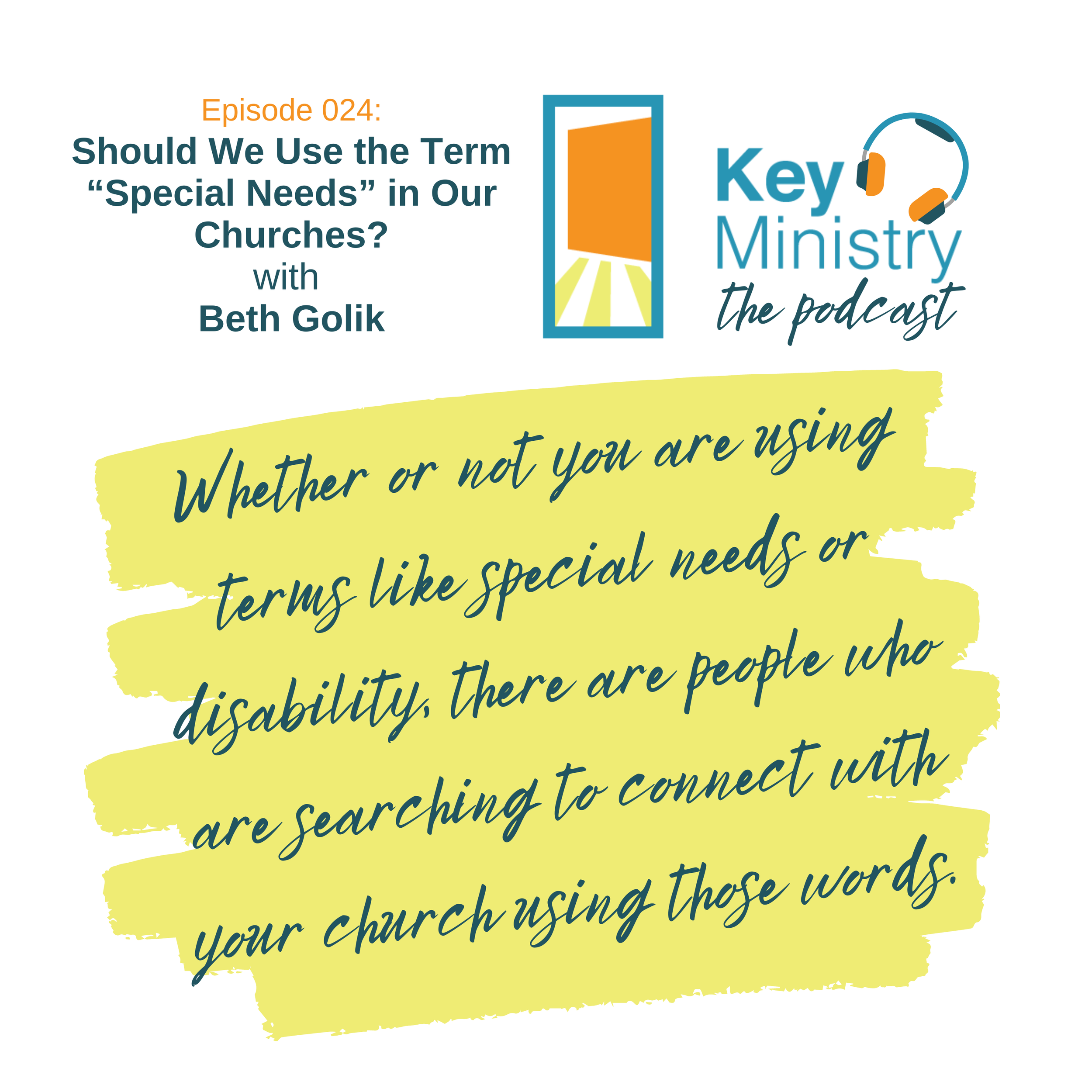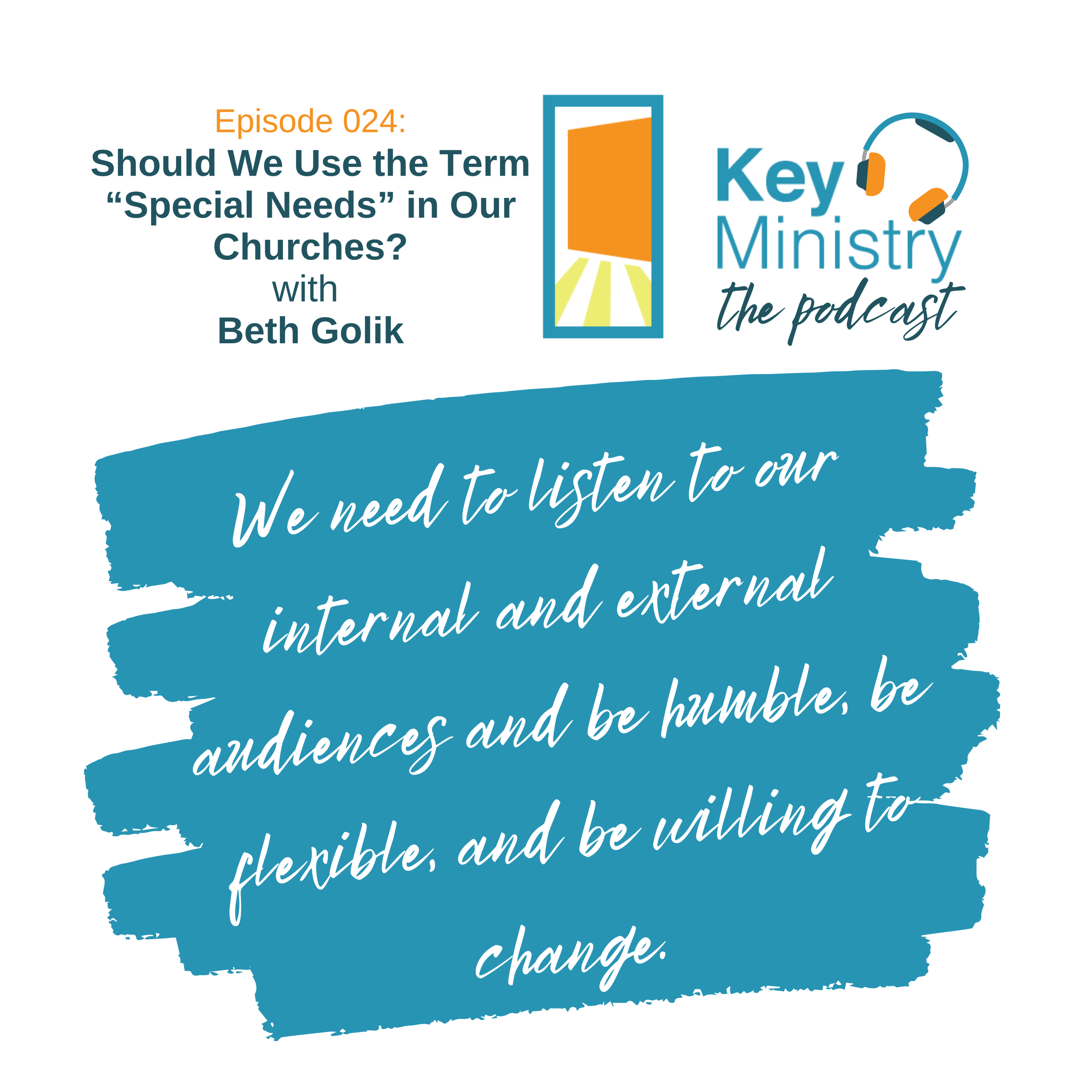In this week's episode, Beth Golik addresses a question that many ministry leaders are struggling with: should we use the term "special needs" in our churches?
Listen now in your favorite podcast app!
Quick Links:
Disability Ministry Video Roundtable Catalog
The Words We Use: A Thoughtful Conversation on the Language of Disability Ministry Video
Disability Language Style Guide
Transcript:
Thanks for tuning in to this week’s episode of Key Ministry: The Podcast. I’m one of your co-hosts, Beth Golik, and today we’re going to tackle a topic that many of you have asked about: what language should we use in disability ministry?
When you drill down on that question, what many people are wondering is: should we use the term special needs?
I’m not going to answer that with an easy “yes” or “no.” It’s a bit more complex than that, plus that wouldn’t be much of a podcast now, would it? Instead, I want to share some takeaways I had from a thoughtful discussion with a couple of dozen ministry leaders on a recent disability ministry video roundtable. Key Ministry hosts these roundtables each month, via Zoom, and this particular month our topic was the language we use in disability ministry. The leaders in this virtual meeting represented churches and parachurch organizations in all different parts of the country. The group was comprised of paid staff and volunteers, men and women, frequent roundtable guests and newbies. Some shared that they themselves had a disability, others shared that they have a loved one with a disability, and some didn’t identify one way or the other. I’m not saying this was a well-designed research group made up of thousands of people. It wasn’t. But, I think the points they made, and the discussion that took place, is worth your consideration.
We started our discussion by agreeing on a framework. We tackled the issue of language not from a secular perspective, but in a gospel framework.
We agreed that we weren’t deciding on what words the world should be using, but that instead we would discuss what words our churches were using to invite those inside and outside the walls of the church into disability inclusion ministry – into Christian community – so that we can make disciples who make disciples.
I have five takeaways from that conversation to share with you:
Language changes. If you’ve been around long enough, you know that the terms surrounding physical, intellectual and hidden disability have changed over the years. There are words that were once in use that are completely outdated now. For instance, intellectual disability has replaced the term mental retardation. There are dozens of examples and if you’ve been around long enough, you’ve most likely personally changed the language you’ve used along the way.
Language is regional. We don’t all use the same words to describe certain things. For instance, if you have a hankering for a cool bubbly drink, are you going to ask for a soda, a pop, or a Coke? The same goes for the language of disability. Oftentimes the language of the local school district informs what terms churches in the area use. Some areas of the country are more likely to use words like special education and special needs in their schools, while others tend towards terms like inclusion.
It’s impossible to please everyone. We want to be as honoring with our language as possible to individuals and families with disabilities. However, it’s just impossible to please everyone. People-first, or person-first, language is generally accepted as the preferred way of describing a person and their disability when it is necessary to do so. It’s what is in the ADA as appropriate language. But keep in mind that some advocates prefer identify-first language. As an example, a person may prefer to identify themselves as autistic rather than a person with autism. I think we are all in agreement that we want to listen to how people refer to themselves and then use the appropriate language—either people-first or identity-first—when in conversation. But sometimes it’s not as flexible as an individual conversation. Sometimes you have to choose words to describe something, maybe on your website for instance, and you need to pick a term to use. Consider your internal and external audience. Who are you inviting in, who is already here, and what will honor them? Take it all into consideration and just know that it’s impossible to please everyone.
Consider your website. Whether or not you are using terms like special needs or disability, there are people who are searching to connect with your church using those words. The church can improve its SEO, or search engine optimization, by including keywords on its website.
Be humble, be flexible, and be willing to change. Let’s face it. Sometimes we’re going to get it wrong. Times change. Language changes. Our churches change. Perhaps your church is moving from a niche ministry that serves children with disabilities—a “special needs ministry”—to more of a disability-inclusive mindset. It’s important that we have the conversations about the words we use. We need to listen to our internal and external audiences and be humble, be flexible, and be willing to change.
So, to recap. My five takeaways from our discussion on the language we use are:
Language changes.
Language is regional.
It’s impossible to please everyone.
Consider your website.
Be humble, be flexible, and be willing to change.
The title of this episode is Should We Use the Term “Special Needs” in Our Churches? Well, should we?
Here’s what this group of ministry leaders concluded. It’s not a yes or no question and we didn’t come up with one magic word that will work for every church, for all time, and will please all people. Oftentimes special needs ministry implies ministry for children with disabilities and families impacted by disability. We agreed there’s an audience searching for Christian community using those words. People get it. Even if you are not actually using it as a ministry name or descriptor, you probably ought to include it as key words on your website for SEO purposes. However, if your ministry context includes adults, or if you are referring to a more general mindset of disability inclusion, perhaps special needs ministry isn’t conveying the complete picture.
Whatever you decide, I applaud you for giving it thoughtful consideration.
For having the conversations. For being humble and flexible in the process. And most importantly, to keep your focus on our gospel mandate to make disciples who make disciples.
I encourage you to check out the shownotes for this episode at keyministry.org/podcast. There’s a link to the original video roundtable where we discussed the language of disability ministry and there’s a link to the National Center on Disability and Journalism disability language style guide.
If this was helpful to you or gave you food for thought, please share it with a friend or on your social media. And don’t forget to subscribe to Key Ministry: The Podcast so you don’t miss an episode from Sandra Peoples, Catherine Boyle, Lamar Hardwick or me.






